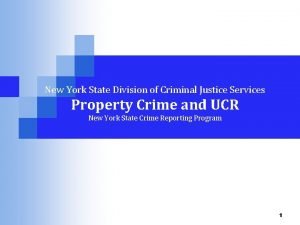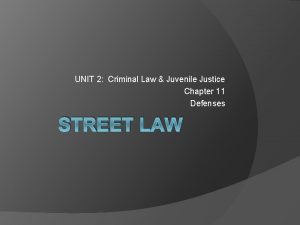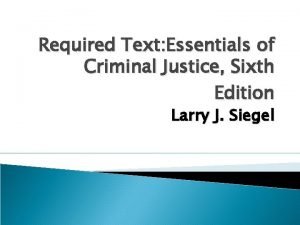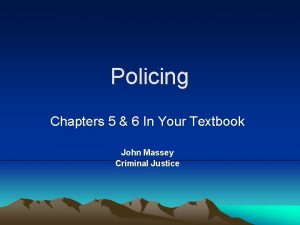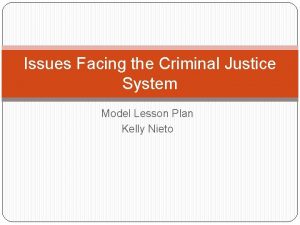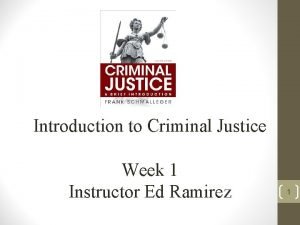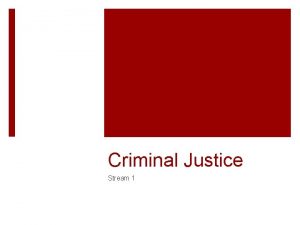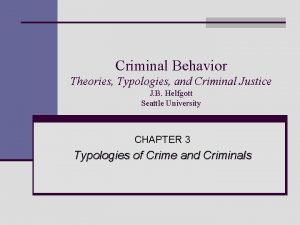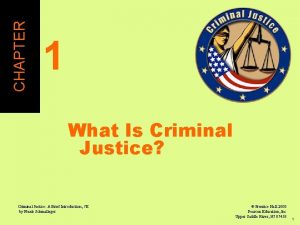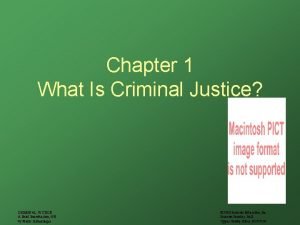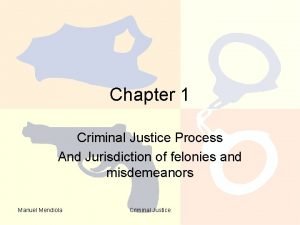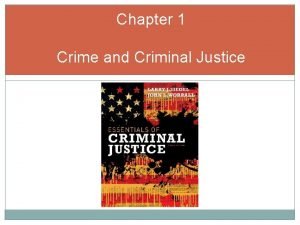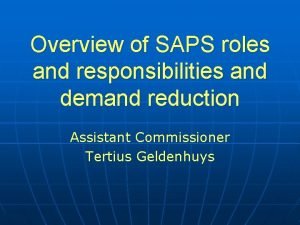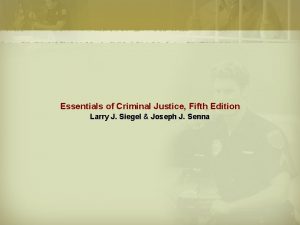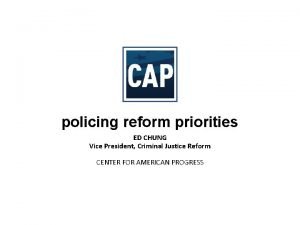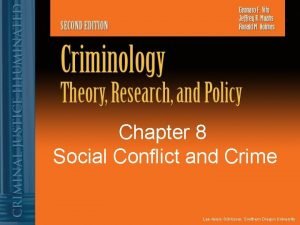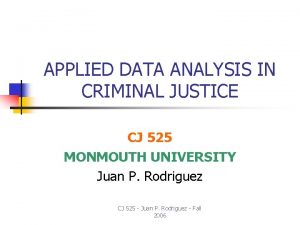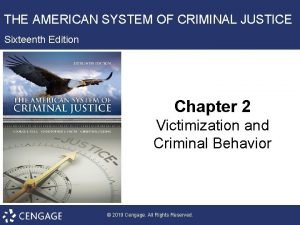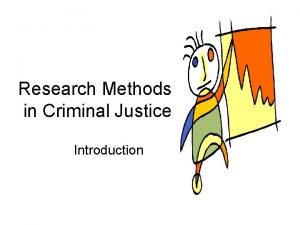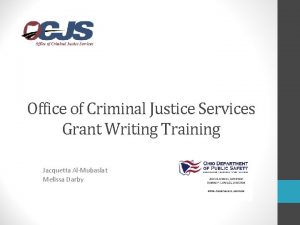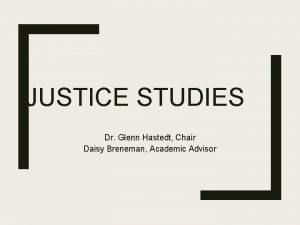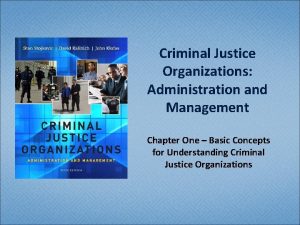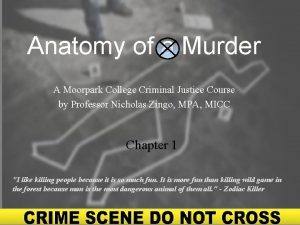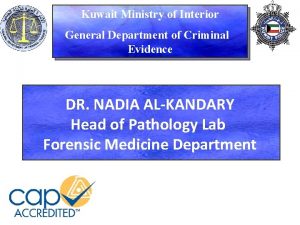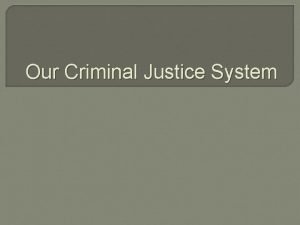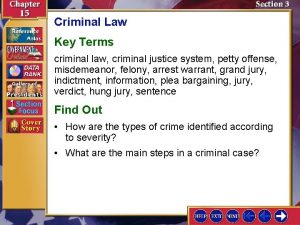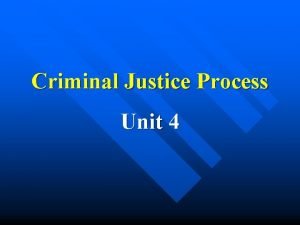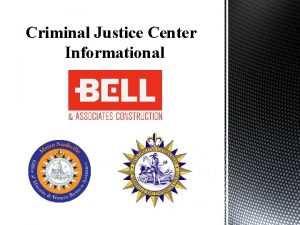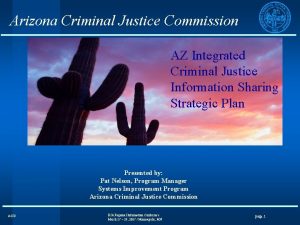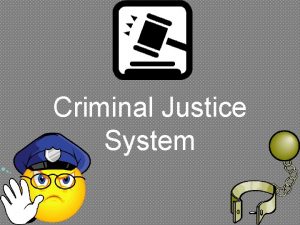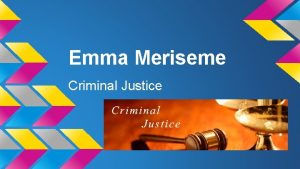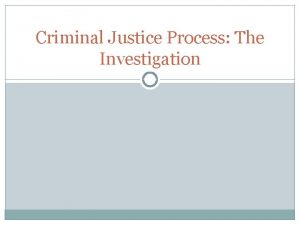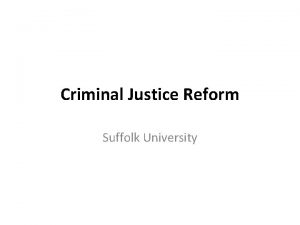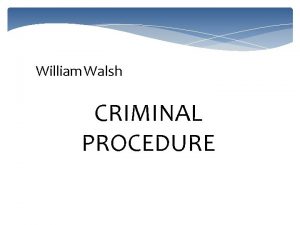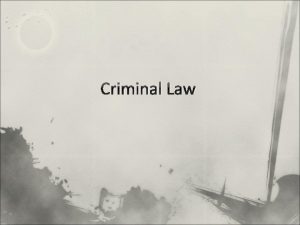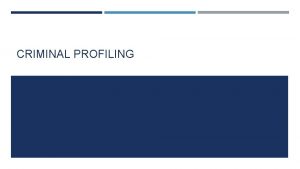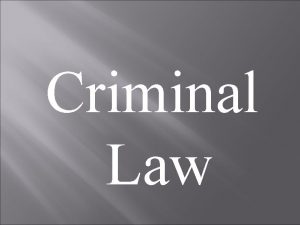DEPARTMENT OF THE ATTORNEYGENERAL AND JUSTICE Criminal Justice




































- Slides: 36

DEPARTMENT OF THE ATTORNEY-GENERAL AND JUSTICE Criminal Justice Law reforms: Recent legislation Current legislative proposals Future legislation and reform projects Northern Territory Civil and Administrative Tribunal 20/21 March 2014

Legislation passed February 2014 Sittings • Criminal Code Amendment (Hit and Run) Act 2014; • Criminal Code Amendment (Child Abuse Material) Act 2014; • Misuse of Drugs Amendment Act 2014; • Criminal Code Amendment (Expert Psychiatric or Medical Evidence) Act 2014; • Mental Health and Related Services Amendment Act 2014.

Criminal Code Amendment (Hit and Run) Act 2013 • • • This Bill amended section 174 FA of the Criminal Code, the offence known as hit and run, to insert an additional requirement to report to Police an incident involving a vehicle where death or serious harm is caused. Section 174 FA requires the driver to notify a Police representative that the incident occurred, the location of the incident, that the driver was the driver of the vehicle involved in the incident and the driver’s name. The driver must also comply with any reasonable direction given by a representative of the Police Force in relation to the incident, for example, to remain at the scene of the incident until a Police officer arrives, or undertake a breath test. A ‘representative of the Police Force’ includes a police officer, or a public sector employee working in a communications centre operated by the Police Force ie a civilian. The general provisions of Part IIAA of the Criminal Code will determine the circumstances in which failures to comply with the Act might not constitute an offence.

Criminal Code Amendment (Child Abuse Material) Act 2013 • The Act passed during the February 2014 sittings and is yet to commence; • Essentially this Act expands the powers of the courts and NT Police regarding the forfeiture and destruction of child abuse material; • The Act amends section 125 B(6) of the Criminal Code to allow a court to order the forfeiture and destruction of child abuse material where there is a finding of guilt. Previously power only applied where there is a conviction; • Sections 125 AG and 125 AC have also been inserted relating to police powers of forfeiture and destruction of material the officer reasonably believes contains child abuse material, regardless of whethere is a finding of guilt. The ‘reasonably believes’ provision is necessary to address circumstances where material is hidden on electronic devices and cannot be accessed eg via passwords or encryption; • There is also a power for an article to be returned, eg a laptop, if police are satisfied that it no longer contains child abuse material.

Misuse of Drugs Amendment Act 2013 The Bill contains three discrete amendments: 1. Enable prescribed drugs to be moved from Schedule 2 to Schedule 1 by regulations; 2. Improve the workability and clarity of Schedule 2 – ie to simplify, to remove duplications and remove positional references. Amendments requested by Police, to allow drugs to be classified as more serious 3. Ensure the aims of the ‘supply in an Indigenous community’ offence are fully realised; – Firstly, it ensures that acts done in preparation to supply will be covered by the offence in section 5(2)(a)(iv), which relates to the supply of dangerous drugs in Indigenous communities, as an aggravating factor. Removing the words ‘to a person’ so that actual supply ‘to a person’ does not need to take place; – Secondly, it ensures that supply offences committed in Indigenous communities will attract the mandatory imprisonment provisions of the Act, regardless which court passes sentence.

Criminal Code Amendment (Expert Psychiatric or Medical Evidence) Act 2013 • Implements a recommendation of the NTLRC; • New section 331 B empowers a court, upon application of the prosecution and at its discretion, to order an accused person to undergo a medical or psychiatric assessment where the accused person intends to adduce expert psychiatric or medical evidence relating to a state of mind, or medical condition, that may have existed at the time of the alleged offence ie to prove the existence of a criminal defence; • Costs of the examination payable by the prosecution (s 331 B(3)); • If the accused refuses to be examined, the prosecution may cross examine the accused and/or any expert called by the accused as to the possible reasons behind the refusal. However, refusal can not go towards guilt.

Mental Health and Related Services Amendment Act 2013 • The purpose of the Bill is to amend the Mental Health and Related Services Act to clarify that Mental Health Review Tribunal is not bound by the rules of evidence. • Until recently, it was generally accepted that the procedures of the Tribunal were to be as informal as practicable and that the rules of evidence need not apply to proceedings before it. Recent comments made by Justice Kelly of the Supreme Court have cast doubt on that assumption. • The exclusion of the rules of evidence will not operate to exclude the common law presumption of procedural fairness/natural justice. The Tribunal will still be bound to observe procedural fairness in its proceedings, such as the right of parties to put one’s case and be heard.

Legislation currently awaiting passage • Criminal Code Amendment (Identify Theft) Bill 2014; • Justice and Other Legislation Amendment Bill 2014.

Criminal Code Amendment (Identify Crime) Bill 2014 • This Bill was introduced on 19 February 2014. • The Bill creates three new specific identity theft offences in the Criminal Code: Section 228 C – dealing in identification information; Section 228 D – possessing identification information; and Section 228 E – possessing equipment used to deal in identification information or identification documentation. • In addition to creating identity theft offences, the Bill provides for a court to issue a certificate to the victim of identity crime confirming that certain transactions were in fact carried out by another person. • It is intended that this certificate will be used by the victim to assist in regaining their identity. The certificate may be issued to a victim irrespective of a prosecution for an identity crime offence.

Justice and Other Legislation Amendment Bill 2014 • This Bill was introduced on 20 February 2014. • All amendments in this Bill have arisen as a result of issues with the interpretation or application of the Sentencing Act, as identified by members of the judiciary or legal profession. • The Bill amends section 64 of the Sentencing Act and section 131 of the Youth Justice Act to clarify that every parolee must serve any unexpired term of imprisonment, upon sentencing for a new offence, regardless of whether their parole is cancelled or revoked by the court when subsequently being sentenced or by the Parole Board. • The Bill also amends section 104 A of the Sentencing Act to alleviate inconsistency with the Racial Discrimination Act 1975 (Cth). • The Bill also amends section 107 of the Sentencing Act to remove the jurisdictional impediment (section 107(6)) on the Supreme Court taking into account summary charges when sentencing an offender on indictment.

Justice and Other Legislation Amendment Bill 2014 • In addition, the Bill introduces new sections 388, 389, 390 and 391 of the Criminal Code to allow the Supreme Court to finalise and dispose of summary charges when sentencing an offender for indictable offences. • Consequently the offender will be convicted and sentenced in the same way as if they had been dealt with by a magistrate and the procedure will ensure the defendant only has to appear for sentence once before one court instead of twice, before two courts.

Legislation for March/May Sittings • Criminal Code (Presumption of Joint Trials) Bill 2014; • Criminal Code Amendment (Dangerous Driving while being pursued by Police) Bill 2014; • Northern Territory Civil and Administrative Tribunal Bill 2014 and Consequential Bill; • Summary Procedure

Criminal Code Amendment – Presumption of Joint Trials • It is anticipated that a Bill to amend the Criminal Code to introduce a presumption of joint trials in sexual offence cases involving multiple complainants will be introduced in the March 2014 Sittings; • The presumption will be modelled on s 194 of the Victorian Criminal Procedure Act 2009; • The reform is consistent with the Pillars of Justice principles to assist victims of crime, particularly victims of domestic violence or sexual offences, so that they do not have to give evidence multiple times where this can be avoided.

Criminal Code – police pursuit offence • The Bill will give effect to a recommendation made by the Territory Coroner resulting from a coronial - Inquest into the deaths of Clifford Norman and Kwementyaye (Jennifer) Taylor [2013] NTMC 001. • The NT Coroner recommended the NT Government consider amending the Criminal Code to insert offence of dangerous or reckless driving whilst being pursued by police. Similar offences have been included in justice legislation in NSW, WA and Victoria. • The Criminal Code will be amended to include an offence of ‘dangerous driving while pursued by Police’. The offence will have a maximum penalty of five years imprisonment and will be structured in a manner similar to the dangerous driving causing death offence.

DEPARTMENT OF THE ATTORNEY-GENERAL AND JUSTICE Pillars of Justice


Pillars of Justice What is the Pillars of Justice project? The Pillars of Justice is a policing, justice and corrections criminal law reform package aimed at tackling repeat offending, youth crime, court processes/delays and violence. This framework is a reassessment of the way certain laws and policies are administered, seeks to streamline court procedures, seeks to provide for the early assessment of at risk youths and seeks to ensure that justice legislation in the Territory is robust. The Pillars of Justice is an integrated policy initiative involving AGD, Corrections, NT Police, and other agencies (for example the Crimes Victims Advisory Committee). The six pillars of the package are: • Police powers reform; • Swift Justice - Court law reform; • Youth Turn – Youth Justice; • Future Corrections - Corrections reform; and • Victims First; • Statutes for a Safer Future.

Pillars of Justice – Governance • The lead Minister for this project is the Attorney-General and Minister for Correctional Services, the Hon John Elferink MLA. • AGD is the lead agency for this project and is providing briefings to the Minister, briefings to the Steering Committee and chairs the Pillars of Justice Working Group. • The Steering Committee includes the CE of AGD, the Commissioner for Correctional Services and the Commissioner for Police and the Working Group consists of members of AGD, Correctional Service and NT Police. The Working Group has briefed a number of advisory bodies on the Pillars of Justice and has received briefings from these bodies.

Swift Justice – Summary Procedure • • Announced on 28 August 2013 and the broad aims of the legislative reforms relate to: – Early disclosure of the prosecution case by way of preliminary briefs of evidence; – Summary case conferencing prior to the service of a full brief of evidence (subject to exceptions concerning certain classes of prosecutions (eg traffic)); – Obligations on defendants to disclose alibi evidence, expert witnesses and factual matters that the defendant considers cannot be proved and evidence that the defendant objects to being adduced; – Sentence indications; – Disclosure of sentence discounts for early pleas; and – Specified graduated maximum discounts applicable for early pleas. The Chief Magistrate has implemented some of these reforms by way of Practice Direction very recently. The intent of shifting meaningful negotiations to the front end of the process rather than discussions occurring on the steps of the court on the hearing date. The Department will conduct consultation on a draft Bill with stakeholders in the next month. The Bill is anticipated to be introduced in the May 2014 Sittings.

Summary Offences • • • The Summary Offences Act Draft Report was released for public consultation in 2012 and again in 2013. A number of submissions were received from stakeholders. A Bill is now being prepared on the basis of this process. The Summary Offences Act will be repealed and replaced with a more up to date Act. The offences will be drafted according to Part IIAA, a number of new offences will be included, some offences will be moved to more appropriate Acts (for example the Liquor Act and Trespass Act), and a number of offences will be repealed. An Exposure Draft of the Bill will be released for public consultation toward the end of May 2014. It is intended to introduce this Bill in the August 2014 Sittings of the Legislative Assembly. The Summary Offences Regulations will also be repealed and redrafted.

Part IIAA conversion • The project to continue the conversion of offences in the Criminal Code to Part IIAA will be continued. • The remaining offences in the Summary Offences Act will be redrafted according to Part IIAA. • The Department will continue to advise all agencies that any new offences should be drafted according to Part IIAA.

DEPARTMENT OF THE ATTORNEY-GENERAL AND JUSTICE Northern Territory Civil and Administrative Tribunal Alice Springs 18/19 March 2014

Background • On 27 August 2013, the Attorney-General delivered a Ministerial Statement in the Legislative Assembly titled “Establishment of an Administrative Appeals Tribunal in the Northern Territory”. The Statement indicated the Government’s willingness to establish a Northern Territory Civil and Administrative Tribunal.

Background • This subject is not new in the Northern Territory and has previously been examined on two occasions by the NT Law Reform Committee (June 1991 and September 2004) and in both Reports, the Committee recommends the establishment such a Tribunal.

Background • The issue of administrative law reform and the centralization of appeal rights from specialist bodies or other decision makers to a single body has been the subject of extensive discussion Australia wide since the establishment of the Commonwealth Government Administrative Appeals Tribunal in 1976.

Background • Since that time, civil and administrative tribunals have now been established in Victoria (1998), Western Australia (2004), the Australian Capital Territory (2009), Queensland (2009), South Australia (2013) and New South Wales (2014). • The Northern Territory and Tasmania remain the last two jurisdictions in Australia yet to follow this path. •

What is the NTCAT? • The Northern Territory Civil and Administrative Tribunal will be a new tribunal, with jurisdiction to hear and determine a broad range of matters. • The Tribunal will have both original (ie it will be the original decision-maker) and review (ie it will examine the decision of the original decision-maker by way of a rehearing) jurisdiction.

What is the NTCAT? • Enabling legislation will create the Tribunal, contain the membership provisions and set out the Tribunal’s generic functions and powers. • It will also establish the independence of the Tribunal by prescribing that neither the Tribunal or its members is subject to the direction and control of the Minister.

What is the NTCAT? • The Tribunal will be led by a President (who is likely to be a Magistrate), supported by one or more Deputy Presidents (who can be a Magistrate or a legal practitioner eligible for appointment as a Magistrate) and Ordinary Members (who can be legal practitioners of not less than 5 years standing or individuals with suitable knowledge or experience).

What is the NTCAT? • The focus of the Tribunal will be on resolving disputes, reviewing decisions of agencies, statutory office holders and statutory bodies and conducting disciplinary proceedings for a range of professions, vocations and occupations.

Benefits • This Tribunal will provide a single, easy to find, easy to use, non-judicial body, for fair and independent resolution of disputes relating to administrative decisions. • Government has also indicated an intention for the Small Claims jurisdiction of the Local Court to be transferred to the Tribunal.

Benefits • Its establishment will enable the consolidation of a range of existing tribunals and removes the present duplication of resources and inconsistencies at a governance and legislative level. This will lead to a more efficient, fairer and faster system of dispute resolution for the community.

Process • Establishing the Tribunal requires the introduction of separate Bills, the first being the enabling legislation, which will set out the structure, membership, and other provisions that are required to facilitate the establishment of the Tribunal.

Process • This enabling legislation will not however confer any jurisdiction on the Tribunal. • Conferral of jurisdiction will be the subject of a series of separate Bills which will consequential amend other laws to authorize the Tribunal to exercise jurisdiction in specific matters.

Timing • The enabling Bill establishing the Tribunal is likely to be introduced in the Legislative Assembly in the May Sittings for passage in June. • Consequential amendment Bill(s) could be introduced in June to provide the Tribunal with its initial jurisdiction.

Timing • If this were to occur, it is possible that the Tribunal would be established early in the new financial year.
 Nys division of criminal justice services
Nys division of criminal justice services Guelph criminal justice and public policy
Guelph criminal justice and public policy Define corrections in criminal justice
Define corrections in criminal justice Chapter 11 basic concepts street law
Chapter 11 basic concepts street law Criminal justice in america 8th edition
Criminal justice in america 8th edition Pornography laws connecticut
Pornography laws connecticut Nonintervention perspective of criminal justice
Nonintervention perspective of criminal justice Grass eater vs meat eater police
Grass eater vs meat eater police Eighth amendment excessive bail
Eighth amendment excessive bail Consensus model criminal justice
Consensus model criminal justice Consensus model criminal justice
Consensus model criminal justice Four pillars of justice
Four pillars of justice Interpret
Interpret Criminal typology
Criminal typology Consensus model criminal justice
Consensus model criminal justice Consensus model criminal justice
Consensus model criminal justice Consensus model criminal justice
Consensus model criminal justice Nonintervention perspective of criminal justice
Nonintervention perspective of criminal justice What are the layers of the criminal justice wedding cake
What are the layers of the criminal justice wedding cake Arizona criminal justice information system
Arizona criminal justice information system Responsibilities and functions of saps
Responsibilities and functions of saps National archive of criminal justice data
National archive of criminal justice data Criminal justice wedding cake diagram
Criminal justice wedding cake diagram Prioritiesed
Prioritiesed Examples of intermediate sanctions
Examples of intermediate sanctions Conflict theory criminal justice
Conflict theory criminal justice Data analysis in criminal justice
Data analysis in criminal justice The american system of criminal justice 16th edition
The american system of criminal justice 16th edition Mexico criminal justice system
Mexico criminal justice system Public health internships ct
Public health internships ct Inaccurate observation in criminal justice
Inaccurate observation in criminal justice Methodology section research paper
Methodology section research paper Jmu criminal justice minor
Jmu criminal justice minor Everyday ethics for the criminal justice professional
Everyday ethics for the criminal justice professional Management in criminal justice organizations
Management in criminal justice organizations Moorpark college criminal justice
Moorpark college criminal justice General department of criminal evidence
General department of criminal evidence
